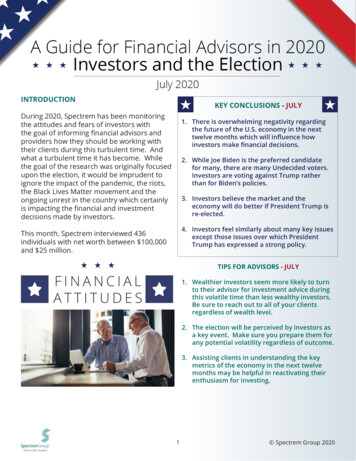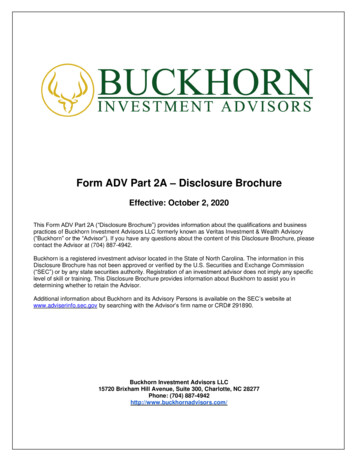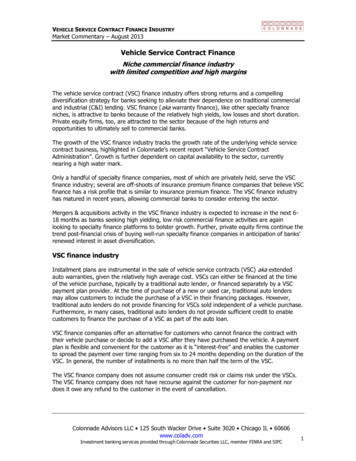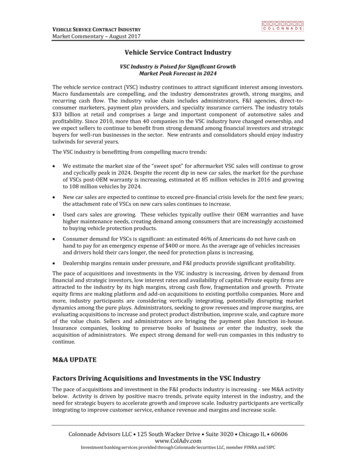
Transcription
PERFICIENTIMPACT OFROBO-ADVISORSIN WEALTHMANAGMENT
PERFICIENTThe wealth management industry isundergoing a serious transformation withtraditional methods of providing financialadvice being disrupted by new and innovative formsof technology. With the unprecedented widespreadadoption of the internet and digital devices, customerexpectations have changed. Clients expect a flawlesscustomer experience that requires businesses, products,and services to be available whenever and wherever theywant. It’s that simple. Companies that provide wealthmanagement services must address this trend quickly orrisk being left behind.A BRIEF REVIEW OF WEALTHMANAGEMENTAccording to Investopedia, wealth management is a“service that combines financial/investment advice,accounting/tax services, retirement planning, and legal/estate planning for one fee.” While that definition is anoversimplification of the term, it’s safe to say that wealthmanagement has historically been a service for high-networth individuals.For purposes of our conversation, note that Investopediaindicates that high-net-worth individuals typically have atleast 1 million in liquid assets. Those with more than 52 / Impact of Robo-Advisors in Wealth Managementmillion are considered very-high-net-worth individuals.Have 50 million in wealth? Then you’re an ultra-high-networth individual. If you’re not fortunate enough to fall intoany of those categories, chances are you’ve never been agood prospect for a company focused on providing wealthmanagement services. The fees would simply be too highfor the individual investor and, frankly, the bank wouldn’tmake enough money from you as a customer.While this is how wealth management has operated fordecades, that doesn’t mean that it should stay that way.It doesn’t mean that an individual investor, without anaccumulation of massive wealth, shouldn’t be able toreceive the same solid financial advice the wealthy do.WHAT ARE ROBO-ADVISORS?While your clients may have never obtained advice fromtraditional wealth management companies, the times arechanging through the introduction of robo-advisors.Unlike traditional human-to-human financial advice,robo-advisors provide personalized, automated financialadvice based on algorithms. They work without the needfor human intervention, making such advice cost-friendlyand ultimately eliminating common high-net-worthmembership figures.
PERFICIENTRobo-advisors can tell investors: How to allocate their money across stocks andbonds, keeping your risk tolerance in mind How much to deposit each month based on thetotal amount they want to invest and their goals Their total net worth How to take advantage of advanced tax strategiesAccording to some reports, tens of billions of dollars arecurrently being managed by robo-advisors, and someestimates indicate that robo-advisors could be managinghundreds of billions, and possibly even trillions, of dollarsin just a few years.THE ROBO-ADVISOR CLIMATEThe benefits of robo-advisors are clear: trustworthy andaffordable financial advice for everyone, regardless ofnet worth. Although some may debate what role roboadvising will play in wealth management, we’ve reached apoint where it’s hard to imagine a world without it.Ever since the evolution of the internet and thewidespread adoption of digital devices, customerexpectations have changed and continue to do so at arapid pace. Today, convenience is a top customer priority.Many people either don’t want or are unable to spendthe time it takes to visit a physical location or talk on thephone to manage their daily lives – including their wealth.Instead, they prefer to manage everything from theconvenience of their homes or offices.For financial institutions to remain relevant in wealthmanagement, they must adapt to the new digital timesby transforming the way they operate. We’re seeingthis digital transformation taking place now. Wealthmanagement firms are partnering with, acquiring, andeven building their own technology solutions to meet theincreasing demand for a better customer experience thatrobo-advisors offer.Human-to-human interaction is strong, and traditionalwealth management services offer a sense of trust. Ifan investor goes to a financial advisor and asks where toinvest, he or she will provide recommendations. Chancesare, the client won’t question them. They’ll just choosewhat they like best.However, digital technology such as robo-advisors alsohas the benefit of being transparent. These solutionswill review all your clients’ assets, give them a completeview of where they stand and where they should be, andthen provide a set of recommendations with reasons foreach one.While the vast majority of assets are still with traditionalfinancial institutions, this is changing. More and more,individuals are leveraging robo-advisors due to theirconvenience, ease of use, affordability, and transparency.As people learn about their options with robo-advising, wewill likely see that portion of the market grow.HOW TRADITIONAL WEALTHMANAGEMENT COMPANIES VIEWROBO-ADVISORSAs much as they are disruptors of sorts, traditional banksview robo-advisors as healthy. They represent a challengefor incumbents, one that will ultimately result in bettercustomer experiences. Financial institutions believethat the foundation of what they do is not going to goaway; however, it puts pressure on them to focus onthe customer experience and, ultimately, the customerjourney.The conversation between incumbents and entrantshas evolved over time. It went from hostility to amuch healthier debate on how all parties are going tocollaborate. Incumbents have been around for a very longtime and customers have made a conscious decision totrust them with their assets. Trust is the foundation.Robo-advisors may not necessarily eliminate traditionalhuman-to-human relationships, but they put the onus ontraditional banks to put forth a better customer experiencewith digital technology. If banks don’t respond to thechallenge and stick their heads in the sand, customerswill gravitate towards convenience and simplicity. Thepressure is no doubt real.Traditional wealth management services and robo-advisingare actually quite complementary. Part of the marketcurrently wants, and will continue to want, a hands-offapproach to investing and wealth management, one inwhich everything is done for them. On the other hand, aImpact of Robo-Advisors in Wealth Management / 3
PERFICIENTgrowing portion of the market prefers to manage their wealthon their own. To meet this new demand from current andpotential clients, banks must satisfy their thirst for this digitalexperience. Robo-advisor tools can help address this need.hold, therefore allowing financial advisors to support thosewho prefer more attention. The robo-advising model simplygives banks the opportunity to scale while meeting customerexpectations for a better digital experience.THE RELATIONSHIP BETWEENWEALTH MANAGEMENT COMPANIESAND ROBO-ADVISORSSome companies, like HSBC, have historically taken aslightly different approach. Similar to the way they built atraditional IT business that keeps the lights running andsoftware applications up-to-date, they invested heavily intechnology and innovation rather than acquiring FinTechcompanies. Other financial institutions, such as Vanguard,Bank of America, and E*TRADE, continue to pour moneyinto developing their own robo-advising solutions. Today,they’re collaborating with all the big names in IT to improvewhat they do for customers from beginning to end.Many robo-advisors are thriving with growing customerbases. Not only are they flourishing, they’re partnering with –and in some cases being acquired by – traditional institutionsthat offer wealth management services. Take UBS, forexample. The company’s wealth management divisionrecently formed a strategic alliance with SigFig, a roboadvisor that will help develop solutions for the bank’s wealthmanagement advisors that ultimately enhance their clients’digital experience. Two other notable examples include AllyFinancial’s acquisition of TradeKing and Blackrock’s purchaseof FutureAdvisor.The automation that robo-advisors provide drives down costsand enables better control and compliance. It gives firmsscale by allowing them to better serve existing customersand address new segments of clients who were traditionallyunserved by wealth management institutions due to a lack ofassets. Remember, robo-advisors eliminate the need to hand-4 / Impact of Robo-Advisors in Wealth ManagementREPLACING TRADITIONAL WEALTHMANAGEMENT OFFERINGS WITHROBO-ADVISORSRobo-advising will likely never take over wealthmanagement, but there are certain elements it could replace.For example, tax-loss harvesting and digital account openingcan be streamlined through technology and automation. Anytasks that serve as barriers to receiving services should beaccomplished by machine. Financial advisors should insteaddo more of what they do best.
PERFICIENTCustomer engagement is key in banking, especially withthe seemingly ongoing market turmoil. Old methods ofcommunicating, such as calling and emailing on a one-offbasis, are unsustainable. Automation and smart machinesenable you to communicate with all customers quickly andpersonably, whether it’s through an email or a text message.It’s something all customers expect. Robo-advising can helpprovide better, more efficient communication methods,resulting in better customer service.One particular area in which robo-advisors can make apositive impact is advisory services. With the high costs ofadvisory services and thresholds that enable one to obtainfinancial help, a massive portion of the investing populationis being excluded.Robo-advising isn’t just for people with lower assets thanhigh-net-worth individuals. High-net-worth individuals arealso showing interest in this technology because the feesaren’t as high, it’s easy to use, and it gives investors thefeeling of more control than what they would probably feelwith traditional wealth management firms.While many believe that millennials are the best – if notthe only – target for robo-advisors because of their lack ofwealth, the data shows otherwise. FutureAdvisor reportedthat more than half its clients are over the age of 40. ForBetterment, 25% of its business comes from customersover the age of 50. All age groups are interested in andchoosing this service because of the convenience thetechnology brings to the table. In fact, many are goingstraight to digital investing tools, bypassing traditionalwealth management institutions altogether.WORLD VIEW OF ROBO-ADVISORSDepending on where investors are located in the world,investor behavior is vastly different; therefore, robo-advisingmay play a different role depending on the region. Somecounties are more conservative and prefer traditional formsof wealth management services, while others are muchmore comfortable with investing on their own. The WorldEconomic Forum conducted research into online behaviorand concluded that people who use the internet in emergingmarkets are much more open and willing to experiment withinnovative solutions than those in developed markets.While geographies dictate how robo-advising is perceived,the same can be said for psychographics. Each segmentof a robo-advisor’s customer base has differences interms of engagement and conversation rates. Aside fromdemographics and psychographics, it’s also important toremember that industry regulations naturally play a rolein the adoption of new banking technologies. The bottomline is this: companies and governments should meet theexpectations of their constituents with the right productsand services.FUTURE OF ROBO-ADVISORSThere’s no question that the core function of managingmoney in a heavily regulated industry is difficult andexpensive. New companies with robo-advising technologywill need to learn how to navigate the regulatorylandscape, making it critical to collaborate with traditionalwealth management firms.From a bank’s perspective, robo-advising remains criticalin terms of servicing customers. Banking’s familiaritywith rules and regulations is unmatched and the personaltouch one feels coming into an office creates trust thatis irreplaceable. For companies with customers who arenot comfortable with investing or navigating the financialmarkets, banks are a saving grace.On the other hand, services delivery can still be through amechanism other than humans. In the financial servicesindustry, consider large broker-dealers like Vanguardand Fidelity, which carry people’s entire savings. Thesecustomers have never met an employee. Outside theindustry, take Uber. Chances are you have never met theUber driver who recently started working for the company,yet you are able to trust the operating model. Boundarieswill be broken. The average retail investor today has theconfidence to go straight to robo-advising. In due time,we’re likely to see that segment of the market increase.The future of robo-advising is very bright. In business,we tend to overestimate progress in the near term andunderestimate the impact and direction things will take inthe long term. As with most technology, slow adoption fora short period of time is not out of the ordinary. At somepoint there will be an S-curve and a point of no return.Impact of Robo-Advisors in Wealth Management / 5
It’s in the best interest of financial institutions to investin these digital solutions and be there when it takes off.The key is to not miss the boat. Those who recognize thebenefits and future of robo-advising first will lead the way.The perfect scenario for the wealth managementindustry is this: in several years, we won’t necessarily bediscussing the effect robo-advising is having on financialinstitutions. Instead, robo-advising will be a tool usedby nearly everyone, from financial advisors in wealthmanagement firms to the average at-home retail investor.WHY PERFICIENTWhether it’s keeping pace with today’s dig
The fees would simply be too high for the individual investor and, frankly, the bank wouldn’t make enough money from you as a customer. While this is how wealth management has operated for decades, that doesn’t mean that it should stay that way. It doesn’t mean that an individual investor, without an accumulation of massive wealth, shouldn’t be able to receive the same solid financial .











